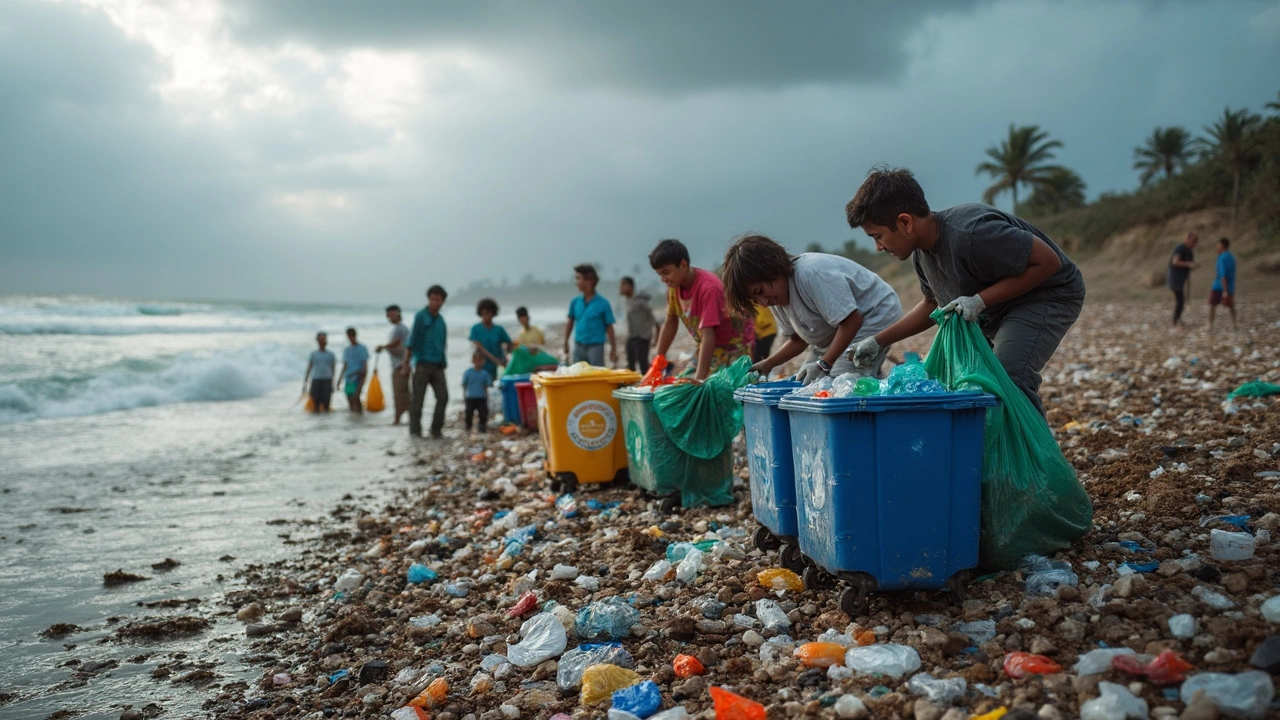Environmental Groups: Who's Making a Real Impact?
 Apr, 3 2025
Apr, 3 2025
Ever wondered what goes on behind those enthusiastic campaigns for saving the planet? Yep, I'm talking about the unsung heroes of the environment—the groups busting their backs to keep Mother Earth in shape. These environmental groups aren't just giant corporations with deep pockets. They're often passionate volunteers and experts joining forces to tackle issues like pollution, climate change, and wildlife conservation.
So, what exactly do these groups do? They're out there cleaning up oceans, planting trees, advocating for policy changes, and educating people like you and me about living more sustainably. And it's not just the famous ones like Greenpeace or the World Wildlife Fund making waves. Local community groups are making strides in their neighborhoods, proving that every effort counts.
- Understanding Environmental Groups
- How They Operate
- Big Names in the Field
- Local Heroes Making a Difference
- How You Can Help
- The Future of Environmental Groups
Understanding Environmental Groups
So, what are these environmental groups everyone keeps talking about? At their core, they’re organizations dedicated to protecting the planet. These groups work tirelessly to address a range of environmental problems, from climate change to endangered species protection.
Many of these organizations focus on a specific aspect of the environment. Some are all about conserving natural habitats and wildlife; others might be keen on promoting renewable energy or even fighting pollution. Each group has its unique mission, but they all share the same goal: a healthier, more sustainable world.
You've probably heard of the big players like the Sierra Club or Friends of the Earth. These groups have been around for decades and have worldwide reach. They’re involved in a variety of activities—from lobbying governments to educating the public. But don’t think it’s just the large organizations making a difference. Small and local groups can have a huge impact, often tailoring their projects to the specific needs of their communities.
And guess what? These groups rely heavily on volunteers. Yep, everyday folks like you and me are crucial to their operations. Whether it’s organizing a local beach cleanup or advocating for better recycling programs, there are endless ways to get involved and help these groups succeed in their missions.
How They Operate
When it comes to rolling up their sleeves, environmental groups have some impressive tactics up their sleeves. Many start with solid research—understanding the problem before they jump into action. They gather data, study patterns, and talk to experts. This isn't just scientific gobbledygook; it's about knowing what needs fixing most urgently.
Many of these groups are all about community engagement. They'll hold workshops, rallies, or even beach clean-ups to get folks involved. It's not just about spreading awareness; it's about making people active participants in the movement. As David Suzuki famously said,
"The future of life on Earth depends on our ability to see the sacred where others see only the common."
Funding is another biggie. These groups often rely on donations, grants, and memberships. Some also partner with corporations that want to boost their eco-friendly image. It's a delicate balance, ensuring they have enough cash to do their thing without compromising their values.
Lastly, many eco-friendly initiatives aim to influence policy. They lobby governments, draft petitions, and campaign for legislation that benefits the environment. It's a long game, often requiring a mix of patience and persistence, but the results can be hugely impactful.
| Initiative | Focus | Impact |
|---|---|---|
| Campaign for Clean Oceans | Marine Pollution | Removed over 5,000 tons of waste |
| Urban Tree Planting | Deforestation | Planted over 100,000 trees |
In the end, the way these groups operate is a testament to their passion and dedication. They're not just talking about green changes; they're making them happen, one step at a time.
Big Names in the Field
When it comes to environmental groups, some names are almost as famous as celebrity activists. These organizations have not only won awards for their efforts but have also set a high bar in the world of eco-friendly initiatives. Let's take a closer look at a few of them.
Greenpeace is like the rockstar of environmental activism. Founded in 1971, they've been on the front lines tackling everything from whale hunting to climate change. They're known for their bold and daring ship campaigns, often capturing global attention with their direct actions. When they say 'save the planet,' they mean business.
“The environment is everything that isn't me.” - Albert Einstein
The World Wildlife Fund (WWF) is another giant when it comes to conservation efforts. Established in 1961, their iconic panda logo is recognized worldwide. They're not just about saving cute animals—they dig deep into conservation science, working to protect the entire ecosystem. From tigers to turtles, they're on it.
Then we have Friends of the Earth. They might not be as loud as Greenpeace, but they're just as impactful. Their focus spans a wide range of issues, like food security and anti-nuclear campaigns. They're all about sustainable practices that help people and the planet thrive together.
Check out this quick comparison of a few initiatives these groups have championed:
| Organization | Main Focus | Signature Campaign |
|---|---|---|
| Greenpeace | Climate Change, Forests | Rainbow Warrior Ship |
| World Wildlife Fund (WWF) | Wildlife Conservation | Earth Hour |
| Friends of the Earth | Sustainable Practices | Anti-Nuclear Movement |
Each of these groups needs support to keep doing what they do best. Whether through donations, volunteer work, or simply spreading the word—every little bit helps these environmental groups continue their vital work.

Local Heroes Making a Difference
Let's give a shoutout to those smaller, often overlooked community groups that are, honestly, kicking butt on a local level. These local environmental groups may not make the nightly news, but they’re making big impacts right where it matters.
Take the Friends of the Earth Scotland, for instance, right here in Edinburgh. They've been doing wonders focusing on climate justice and a sustainable future for Scotland. With grassroots campaigns, they encourage people to choose greener transport options and support policies pushing for reduced carbon footprints.
Another fantastic initiative is the Edinburgh & Lothians Greenspace Trust. They work closely with local communities to improve greenspaces and encourage biodiversity. Whether it's organizing community gardens or leading tree-planting events, they’re hands-on in making sure our local environment flourishes.
Even smaller groups, like beach clean-up clubs along the Firth of Forth coastline, deserve recognition. They gather volunteers, equip them with gloves and bags, and hit the beaches after storms to remove the piles of plastic and trash that wash ashore.
These local heroes are proof that it doesn't take a massive organization to influence sustainability. If curious how you can pitch in, check out their online pages or pop by one of their events. There’s always room for one more helpin' hand!
How You Can Help
Thinking about pitching in but don't know where to start? Small actions are more powerful than you think, and getting involved with environmental groups can really amplify your efforts. Whether big or small, every action counts.
First off, consider joining a local group. They often have regular meetings or events like tree-planting drives or beach clean-ups where your helping hands would be deeply appreciated. It's a great way to meet like-minded people, too!
If you’re short on time but still want to make a difference, volunteers are often needed for things like organizing events or handling social media outreach. Skills like graphic design or writing can be used to create awareness campaigns and informative materials.
Feeling more charitable? Donations, whether financial or supplies like reusable materials, can significantly support ongoing conservation efforts. Plus, many organizations are transparent about how funds are used, so you can see the direct impact of your contribution.
As David Attenborough once said, "The truth is: the natural world is changing. And we are totally dependent on that world. It provides our food, water, and air. It is the most precious thing we have and we need to defend it."
Educate yourself and others. Share what you’ve learned about conservation or sustainability with friends and family. You could host a documentary night with films about environmental challenges, sparking conversations that could lead to real actions.
- Reduce, Reuse, Recycle: Embrace these habits at home, and don't shy away from encouraging your community to do the same.
- Support Eco-friendly Products: Buy from businesses that prioritize sustainability—increase demand for ethically produced goods.
- Advocacy: Write to local officials about environmental issues that matter to you or sign petitions calling for eco-friendly policies.
Ultimately, we all share the same planet, and it's our collective responsibility to protect it. So pick one, or several, things from this list and see the impact you can make!
The Future of Environmental Groups
So, how are these environmental groups shaping up for the future? Well, let's just say they're not sitting on their hands. With the world becoming more eco-aware, these groups are stepping up their game in some pretty exciting ways. Technology, you know, isn't just for streaming cat videos; it's also revolutionizing how groups like these operate. Drones, for instance, are being used in conservation efforts to monitor wildlife and map deforestation.
And there's the digital advocacy angle—using social media and websites to rally support, educate the masses, and crowdfund for projects. It's turning casual scrollers into dedicated eco-warriors. More than that, collaborations with tech companies and innovators are unlocking new tools and platforms for sustainable solutions, making the impact of these groups even more noticeable.
But wait, there's more! Younger generations are taking the lead, bringing fresh perspectives and energy. Gen Z folks are climbing on board with the kind of vigor that promises to keep these movements not just alive but thriving. They're bringing in ideas like eco-entrepreneurship, where stable businesses meet eco-friendly practices.
However, it's not all smooth sailing. These groups face big challenges, like securing funding and dealing with political barriers. Yet, the determination is real, and so is the community support. By engaging with local communities and governments, these eco-friendly initiatives are finding clever ways to overcome obstacles.
If you're thinking of joining the movement yourself, now's the time! Volunteer, donate, or even start your own local environmental group. Every little action helps shape a positive future, and trust me, the Earth and these groups could definitely use your help.
